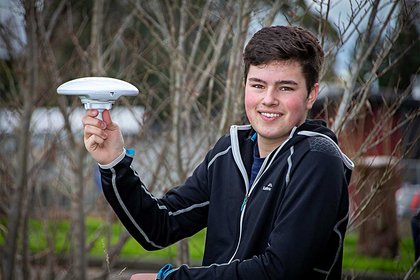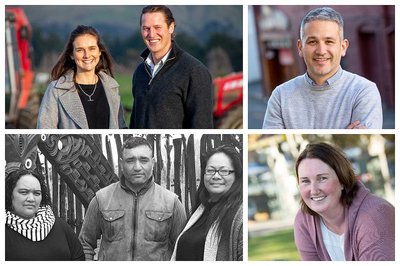
Fourteen-year-old entrepreneur Alex Stewart will receive support from the Rural Innovation Lab.
A 14-year-old entrepreneur looking to provide broadband access to isolated, rural communities is leading one of four rural innovation projects to receive support from the Rural Innovation Lab, of which Massey University is a key partner.
Lab chairman Mat Hocken says the projects came from a wide call-out for people to submit ideas to help solve burning issues in the rural sector, as identified by farmers and growers.
“Farmers are facing a myriad of challenges,” Mr Hocken says. “How do we move from our existing systems and succeed in an uncertain and challenging future? The best way to get ahead of disruption is to innovate.
“The four innovation projects were selected from a pool of 50 applications and also include a carbon calculator co-designed with farmers to estimate on-farm emissions, an online platform for farmer-to-farmer rentals and the development of a Māori agribusiness collective. We also have 80 third-year Massey University students working on a further 10 projects.”
Integrative studies course leader Associate Professor Brennon Wood, of Massey’s School of Agriculture and Environment, says the relationship with the Rural Innovation Lab allows agriculture students to connect with the industry they will soon join.
“The focus of this course is problem-solving in a real-world context. The third-year students have to draw upon multiple parts of their degree to help solve these issues,” he says. “The students gain not only valuable experience, but also contribute their knowledge to important problems in New Zealand’s primary industries.”
Addressing key challenges in the rural sector
The Rural Innovation Lab was launched in Palmerston North in February 2019. Since then, it has engaged with over 150 farmers, growers and Māori landowners to identify the key challenges they face, and develop solutions.
It’s four key projects will receive a package of support from the lab, including project facilitation from start-up experts The Factory; access to partners within the lab’s collaborative network, including Massey University, Microsoft and the e-centre; mentoring by leading farmers and growers in the Manawatū/Whanganui region; and a contribution to project costs.
“We’ll be supporting the four project teams to engage with farmers and growers to help shape their ideas, facilitating their development over the next few months and providing them with mentoring from leading farmers in the region,” Mr Hocken says.
“When you have a 14-year-old entrepreneur creatively responding to challenges farmers and growers are facing, it’s a very exciting time to be in the primary sector.”
The farmer and grower-led collaboration between the Manawatū Farmers and Growers Innovation Collaborative, Massey University, The Factory, Microsoft, e-centre, local Māori farmers, Te Au Rangahau, Performance Beef Breeders New Zealand and Federated Farmers received $400,000 of funding from the Government’s Provincial Growth Fund.
The projects were announced at a celebration afternoon tea at Parliament. Minister of Agriculture and Rural Communities Damien O’Connor said the projects support the Government’s priority to assist thriving and sustainable regions.
“These projects exemplify the sort of enterprise and innovation that we want to see in our rural communities,” he says. “The food and fibre industries are the backbone of New Zealand’s economy, delivering more than $45 billion in export revenue last year.
“The Coalition Government wants to help extract more value from what they already do, in a sustainable way that means our natural resources will be there for future generations. New ideas and technologies like these are essential if we want to keep our primary sector growing and maintain a competitive edge.”

Alexandra Tully and Scott Cameron want to develop a peer-to-peer lending programme; Lisa Warbrick, Wilson Karatea and Taruke Karatea from the Māori Agribusiness Collective; and Mark Teviotdale and Jo Kerslake, the people behind AbacusBio.
Rural Innovation Lab project details
WombatNET – Alex Stewart
Alex Stewart is a 14-year-old entrepreneur from Whanganui. He is using the latest rural networking technologies to provide broadband connection to rural communities at an affordable cost. Mr Stewart has already run a small-scale trial on a rural property in Okoia where he beamed a farmer’s home broadband connection down to his woolshed, making high-speed WiFi available on every corner of his farm. The Rural Innovation Lab will support WombatNET to purchase critical infrastructure, engage with the smart farm network to expand its reach and gather user feedback. https://www.wombatnet.co.nz/
AbacusBio – Jo Kerslake and Mark Teviotdale
AbacusBio will design a calculator to estimate on-farm carbon emissions. The project will bring together Manawatū-Whanganui farmers and AbacusBio’s data scientists and software developers to co-design the calculator. The Rural Innovation Lab will connect AbacusBio with its extensive farmer network an support farmer input into the design.
Alexandra Tully and Scott Cameron
Alexandra Tully and Scott Cameronhave developed a concept for a peer-to-peer lending platform to create financial opportunity for farmers. The website and app-based platform will allow farmers to list their unused machinery and generate income from it. All machinery will be covered by insurance, protecting both owners and users. It will allow farm jobs to be carried out without the wait time and costs associated with hiring contractors. The Rural Innovation Lab will support the duo to get the idea off the ground, including concept validation and business model development.
Māori Agribusiness Collective – Lisa Warbrick, Wilson Karatea and Taruke Karatea
Lisa Warbrick, from Smith Warbrick and Associates, and Wilson and Taruke Karatea, from Te Reureu Valley, aim to develop a Māori Agribusiness Collective. The initiative will support greater participation of Māori landowners in the economic growth of the Manawatū/Whanganui agribusiness sector. The project will develop an engagement programme to support whānau to develop their land in a sustainable way for future generations. The Rural Innovation Lab will support relationship engagement and co-ordination, as well as the development of ongoing communications channels.